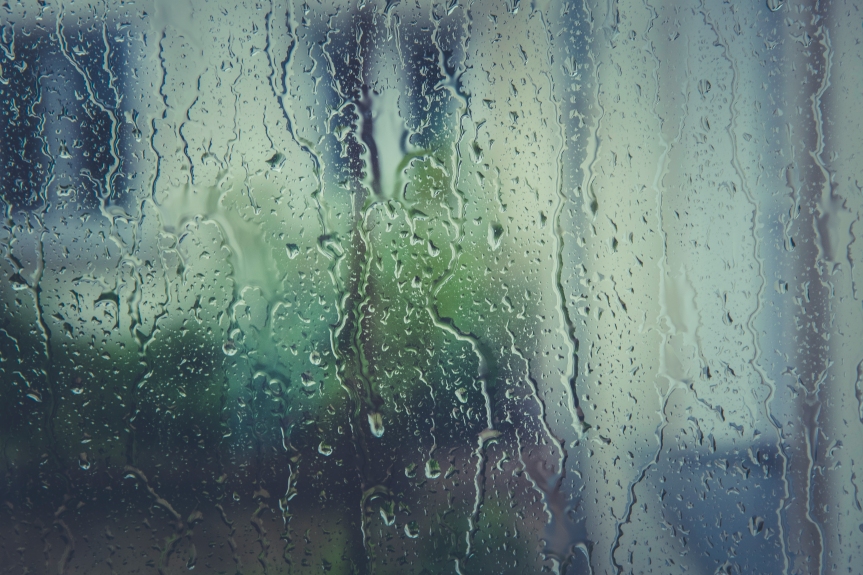
This post is copied from our older, original blog. Original post date 05/17/2012.
By Marcie Bower, Lic.Ac.
I’ve been talking a lot to patients this week about dampness. Seasonal allergies are in full swing here in Massachusetts (did you know acupuncture can help? It can!), and plus its been raining 80% of the time for the last month. So what is dampness?
Dampness is a concept in Traditional Chinese Medicine that basically refers to an abnormal state of the body’s energy that results in a pathological accumulation of fluid-type stuff. Dampness has obvious physical manifestations: mucus and phlegm are examples of dampness in the body, so a runny nose, coughing up phlegm, or feeling congested are all related to dampness. (This is where seasonal allergies come in.) Other obvious examples would be goopy eyes, any sort of discharge or pus, or post-nasal drip.
These examples of dampness all relate to fluid-type stuff that we can see and feel. And the above examples refer to dampness in the head or chest. But dampness can also occur in our middle and lower bodies, too, and sometimes these manifestations are not as visible to an untrained eye. Dampness is heavy, sluggish, thick, and kind of grimy. Healthy fluids are not dampness. Therefore, dampness in the middle of the body may manifest as weight gain, a slow metabolism, and, not to get too graphic (acupuncturists love graphic), chronically watery or sticky stools. Dampness can also affect our reproductive and genitourinary systems – for women, medical conditions like PCOS, ovarian cysts, fibroids, or excessive discharge are often related to dampness. For men, some prostate issues have a damp component. Cloudy urination is also a product of dampness in the bladder (remember, dampness has a kind of unhealthy and grimy quality to it.)
Overall, feelings of heaviness, sluggishness, and lethargy can be linked to dampness in our system. Dampness can settle in our emotional being and cause fuzzy-headedness, memory problems, and difficulty concentrating. Some panic disorders are related to dampness in the emotional center.
Dampness can also settle in our joints. Chronic joint pain that tends to be worse with rainy weather often has a damp component – also really any time there is edema and swelling, dampness is playing a role.
How do we become damp?
Like any disease, dampness finds a place in our system due to other underlying weaknesses – if our immune system is tired, we get sick. If our Qi isn’t strong, then it can’t process fluids correctly and dampness ensues. Some people have a natural tendency to dampness building up in their bodies, while others have tendencies to different pathologies. However, there are MANY lifestyle choices that we make that produce dampness in our bodies or make us unable to avoid dampness.
DIET
Many foods have damp qualities to them and directly produce dampness in our bodies. The biggest culprits of dampness production are dairy and refined sugar. Wheat can be another big dampness-producer. Obesity is often related to dampness in TCM. Looking at the Standard American Diet (SAD), it is easy to see why! I see this a lot with kids. Parents will bring their kids in to the office for treatment of frequent colds, seasonal allergies, or other damp-related disorders. Too often, the mainstays of the kid’s diet are milk, cheese, bread, low-quality meat, and baked goods. ALL OF WHICH PRODUCE DAMPNESS. So, as much as possible, limit dairy and sugar, and substitute complex and sprouted grains for the simple white or wheat bread. (To get the good benefits of dairy, you can include yogurt with no added sugars, and a small amount of goat cheese. Look for other sources of calcium, like spinach, salmon, almonds, broccoli, bok choy, and tofu.)
The other way that our diet produces dampness is by weakening our digestive energy. When the digestive energy is weak, dampness ensues. Often chronic respiratory issues can be improved by strengthening the digestive function, for this reason. In general, eat hearty cooked meals, rather than raw food. If you eat a salad, follow it up with a cup of herbal tea. Stay away from fried foods, processed foods, refined sugar, and fatty meat. For more on protecting your digestive health, read this post about the Spleen.
ENVIRONMENT
Dampness has a way of seeping into our body through our surroundings. Hence why damp symptoms often are worse in rainy weather. So if you live in a really damp environment, take extra care to make sure your diet doesn’t promote excess dampness. Use a dehumidifier to rid your living space of dampness. Try to sleep on a ground floor or upper floor in your home, as opposed to a basement, if possible.
Likewise, don’t sit on wet and cold ground. Many ancient Chinese texts talk about all sorts of female reproductive problems – from painful periods to infertility – being linked to sitting on a cold and wet ground or wading in cold water. This is not to say you can’t go swimming…just be sure you dry yourself off immediately, and change out of wet clothes as soon as possible. Sit on a chair or a towel rather than on the cold ground, if you are at a festival or parade or concert.
As someone who LOVES to run in the rain, this one was hard for me to adapt to. And I have to admit that I still sometimes go out for that warm summer evening rainy run. But I make sure to change my clothes immediately, and I try my best not to run in the COLD rain, which is much more likely to cause dampness in my system.
CONSTITUTION
Some individuals have a natural proclivity towards developing dampness – think of it like energetic genetics. If you are someone who has had issues with dampness for your whole life, you may just have a tendency to develop this kind of pathology. This means that you need to be extra diligent in the food and lifestyle choices you make. Also, protecting your digestive energy can strengthen the underlying weakness that likely made you damp in the first place. See here for more info on that.
How do I get rid of dampness?
First off, try to make as many of the dietary changes and environmental suggestions outlined above. Diet is the number 1 cause of dampness in the body, and you can see a remarkable change in symptoms through changing your diet.
There are also ways that you can moderate the damp effects of certain foods:
- Toast bread instead of eating it untoasted.
- Include a pungent garlic or pesto sauce with pasta: the pungent flavor can cut through the dampness and preventing it from clumping together.
- Use goat’s milk and sheep’s milk products instead of cow’s milk, if using dairy.
- If you eat cheese, try to do so in conjunction with pungent and decongesting foods, such as crisp apples or onions. Cottage cheese can be flavored with garlic or chive, and pizza can be topped with garlic, anchovy, onion, or olive. (A better alternative, for damp conditions, is to ditch the pizza altogether.)
- If you have a meal of heavy meat, try to eat it with something like mustard or horseradish to help resolve the dampness. Accompany the meat with a salad of bitter greens, like arugula, watercress, and chicory.
- Substitute all natural, local honey for sugar and any artificial sweeteners, if needed.
Secondly, MOVE! Dampness causes everything to slow down and become heavy and stuck. Getting your Qi moving helps the body’s natural resources break up the Dampness. Try to exercise at least 30 minutes per day, every day. If you don’t have joint problems that limit your mobility, try to take the stairs instead of the elevator. Get up from sitting at your desk at least once per hour and walk around your office.
Drink warm fluids. It may seem counter-intuitive to drink fluids when you have a problem with the way that your body processes fluids, but water can actually help A LOT. If you are suffering from an acute damp condition (like a cold with a runny nose, or seasonal allergies), drinking enough fluids helps your body flush out the toxins. If you are dealing with a more chronic pathology, being sure to get enough fluids helps to ensure that the rest of your body’s systems function optimally. Don’t drink cold beverages if you suffer from any type of damp condition – the cold shocks the digestive system and can actually make the dampness worse. Instead, drink room temperature beverages or hot herbal tea. The warm quality of the tea can often help the body to dry some of the dampness in the body.
Lastly, get balanced! Dampness is a telltale sign that your energy systems are out of whack. Acupuncture and Chinese Herbal Medicine can help get you back on track, and support your body’s own natural strengths. They remind your body that it innately knows how to transform and transport fluids to help you achieve optimal health, and say goodbye to that dampness once and for all!

